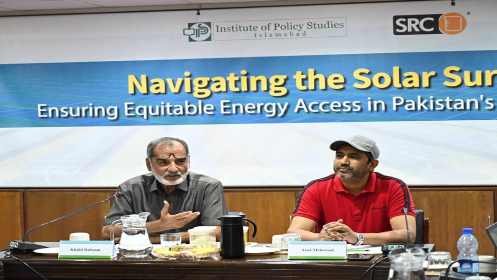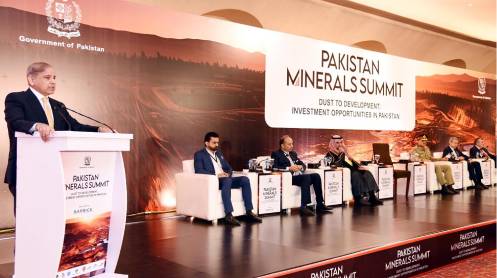ISLAMABAD:
The rapid growth of rooftop solar systems is transforming Pakistan’s energy landscape but also creating disparities for lower-income electricity consumers who remain dependent on the traditional grid. To address this, ensuring equitable energy access for all consumers is crucial.
This concern was the focal point of a session titled “Navigating the Solar Surge: Ensuring Equitable Energy Access in Pakistan’s Power Sector,” hosted by the Institute of Policy Studies (IPS), Islamabad.
The session featured insights from IPS Chairman, Khalid Rahman, senior IPS associate, Ameena Sohail, Amreli Steels head of energy & sustainability, Abubakar Ismail, CEO of Siddique Renewable Energy, Muhammad Musaddiq, renewable energy expert Asad Mahmood and former federal secretary for Water & Power, Mirza Hamid Hassan.
IPS research officer Wali Farooqui presented the study and pointed out that while falling solar costs have led to its mass adoption, it is mostly elite consumers benefiting from these savings. He noted that this shift is creating a two-tiered energy system, where those who cannot afford solar are at an increasing disadvantage, burdened with higher bills. “Those with higher-paying capabilities can shield themselves from rising electricity prices but this leaves lower-income consumers worse off as they are left facing a greater share of the grids costs,” he stated.
Adding to the discussion, Khalid Rahman emphasised that the lack of timely amendments to net metering policies is exacerbating these inequities. He called for more inclusive policy development that ensures both solar adopters and grid-dependent consumers are treated fairly. Energy advocate Ameena Sohail warned of the strain that unchecked solar growth could place on grid operations. She said that solar is commercially viable, but we need a regulatory framework that supports system stability while promoting solar adoption equitably.
Amreli Steels head of energy & sustainability, Abubakar Ismail raised points regarding balancing frequency, voltage and supply from the grid during nighttime adds further costs that may not be fully accounted for. He warned that without policy and regulatory frameworks, the escalating shift towards solar could lead to imbalances in grid stability, potentially leading to a “duck curve” scenario in the next two years or so.
In his closing remarks, Mirza Hamid underscored the importance of striking a balance between net metering consumers and those who remain dependent on the grid. The session ended with a call for collaboration between stakeholders to ensure a sustainable and fair energy transition for all.





